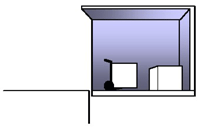Every elevating device has a loading
classification pertaining to the capacity of the elevating device and to the
nature of the loading method. It is important that the loading classification
matches the intended use of the elevating device in order to ensure safe
operation.
Class A Loading
Most passenger elevator
systems and standard freight elevators are designed as Class A, or “General Freight
Loading”. The actual amount of a one-piece load being moved on to or off of the
elevator cannot exceed 25% of the stated capacity of the elevator system. For
example, although the capacity of the elevator may be 2,000 lbs (907 kg),
the actual limit of a one-piece load is 500 lbs (226.75 kg). As well, the
loading or unloading of the elevator is restricted to manual means or to a hand
truck. In the event that a hand truck is used the weight of the equipment must
be included as part of the 25% loading restriction.
Class B
Loading
This class pertains to
freight elevators that are intended for the transport of motor vehicles only,
up to the stated capacity of the elevator system.
Class C
Loading
NOTE: Class C
loading is not permitted for accessibility lifts or for LULA elevators.
Class C1 Loading
This class allows industrial truck
loading or unloading of the elevator system. The combined weight of the
industrial truck and the load cannot exceed the stated capacity of the
elevator. The loading device can remain on the elevator during operation.
Class C2 Loading
This class allows for the loading of the
platform at 150% of the stated capacity of the elevator. In most cases, this
allows for a one-piece load that equals the capacity of the elevator to be
loaded with a forklift or motorized lift truck on to the platform of the
elevator. The loading device must be removed prior to the operation of the
elevator.
Class C3 Loading
This
class allows for heavy concentration loading where the static load during
loading and unloading does not exceed the rated load. The combined weight of
the load and equipment must not exceed the stated capacity of the elevator
system. In practice, Class C3 elevators are most often designated to support
single piece loads equal to the capacity of the elevator.
Much
of this information was taken from two web pages
www.delawareelevator.com
& www.delta-elevator.com
If
you have any questions or would like information from Colley Elevator you can
go to www.colleyelevator.com, email Craigz@colleyelevator.com or call 630-766-7230.











